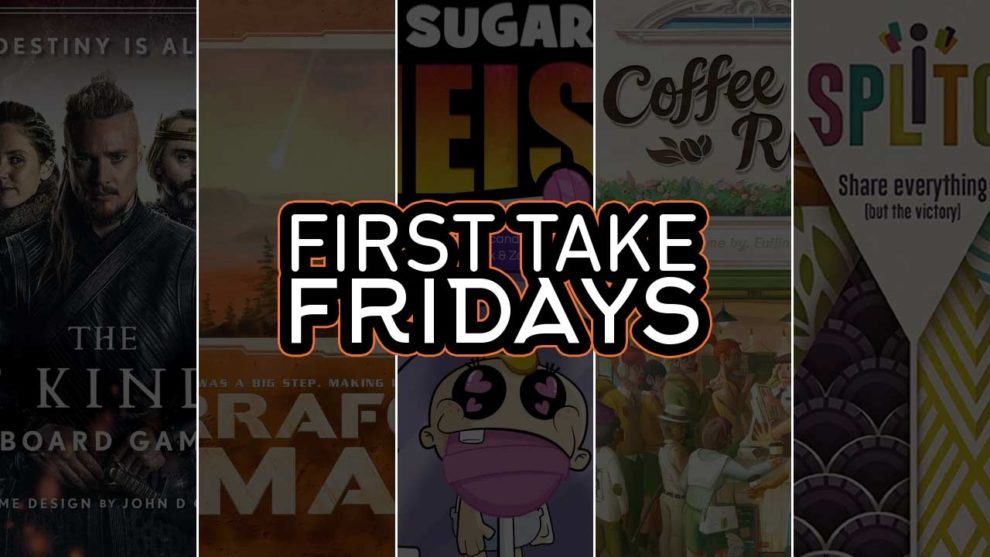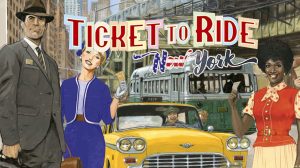The Last Kingdom Board Game – David Wood
In the late 9th century, the Danes invaded the Saxon kingdoms of what will eventually become England. Based on the hit Netflix series and novels by Bernard Cornwell, players take on the role of one of the major characters allied to either the Danes or Saxons. Although they start allied with one side, they can change their allegiance repeatedly over the course of the game.
Over two rounds, players draft cards and play them to take various actions. Once all players pass consecutively, there is a conflict in one of the five kingdoms. Leaders on the winning side of the battle gain victory points based on their affinity with each faction taking part in the conflict. This is repeated until a conflict has been resolved in all five kingdoms. After two rounds, the player with the most victory points wins.
The game successfully recreates the chaos of medieval combat through the play of cards and market actions that can suddenly shift the tide of each conflict. By skillfully managing your hand of cards, increasing your affinity with the right factions, and changing your allegiance at the right moment, you can score more victory points than your opponents. There is no such thing as a sure victory. Destiny is all!
Ease of entry?:
★★★★☆ – The odd bump or two
Would I play it again?:
★★★★☆ – Would like to play it again
Read more articles from David Wood
Terraforming Mars – Bob Pazehoski, Jr.
I came across this small indie title recently, and my friends said they thought I would enjoy it. Truth be told, I put off playing Terraforming Mars for the longest time because, broadly speaking, I have no interest in space games. Thankfully, TM has nothing to do with space—it could just as easily have been Terraforming Utah and would have felt the same. Yes, I know the theme is there and it is strong, but it is a terrestrial game and that makes all the difference.
Despite the number of titles, mechanics, and icons I’ve encountered, I struggle to onboard quickly when a game has as much information as TM sprays at new players. In fact, the cards are a strange contradiction in that the provided text is unduly overwhelming (even if helpful) at the beginning, and then immediately unnecessary and unwanted when the game is learned. I’m not sure how I feel about it. I understood enough to build a small but respectable engine at the beginning that served me well and saved me from total embarrassment. I would say learning curve and playtime are the largest negatives among a heaping pile of positives. I now understand the hype a bit more than I did before.
Ease of entry?:
★★☆☆☆ – Not an easy onboard
Would I play it again?:
★★★★★ – Will definitely play it again
Read more articles from Bob Pazehoski, Jr.
Sugar Heist – Justin Bell
I enjoy “take that” gameplay elements from time to time. I don’t enjoy when that is the entire gameplay loop and that loop takes more than an hour to play. But apparently I’m not the only person like that, because after just the second turn of my first play of Sugar Heist (2020, Maestro Media, Studio71), my partner in a two-player game asked if we could halve the end-game trigger because he was having such a bad time with this game.
Sugar Heist does feature fantastic, adult-skewing artwork featuring children from designer/illustrator Alex Clark, and for a game with only maybe four rules, it does provide a colorful and engaging 16-page rulebook. (Wasteful? Absolutely. Still, the rulebook seems to be enjoying itself.) But sadly, the praise ends there. The gameplay loop is not interesting, it’s a luck-based, top-deck draw dependent experience that should run 20 minutes instead of 60, and has two points cards in an action card deck that are the definition of “swingy.”
Is it fun to steal candy cards from another player and place them in your vault to score end game points the first time? Absolutely. Is it fun to get robbed for the fourth time in a two-player game based purely on the luck of drawing more attack cards than your opponent? Nope!
Ease of entry?:
★★★★☆ – The odd bump or two
Would I play it again?:
☆☆☆☆☆ – No chance
Read more articles from Justin Bell.
Coffee Rush – Tom Franklin
Coffee Rush appears to be a standard pickup and delivery game, this time featuring the drink orders that come in at your coffee shop. On your turn, you’ll move your token up to three orthogonal spaces on a board of ingredients, picking up one of each ingredient you land on. You’ll divvy those ingredients into separate orders to be completed at the end of your turn.
Each time you complete an order, the players on either side of you will gain an additional order they’ll need to fulfill. You’ll have five rows of orders to choose from, with all uncompleted orders moving down one row at the end of your turn. After your fifth turn, any uncompleted orders from the bottom row become negative points. The first player to have of these five negative points ends the game.
The majority of my orders required four ingredients, meaning they were impossible to fulfill on a single turn. With no way to build an engine or acquire additional ingredients, Coffee Rush felt like “Who Will Win?” and more like “Who Will Lose First” game. Either I’m missing something major, or this game had very little playtesting or constructive feedback.
Ease of entry?:
★★★☆☆ – There were a few questions
Would I play it again?:
☆☆☆☆☆ – No chance
Read more articles from Tom Franklin.
Splito – Andy Matthews
I’ve been looking forward to Splito since I first saw the details about it from last year’s Essen SPIEL. Splito is a light card game with a decidedly distinct way of playing and scoring. Instead of each player being responsible for their own points, players share a score between the player to their left and the one on their right. At game’s end, each player multiplies both left and right total to achieve their own personal score. That means if you share 6 points with the player to your left and 5 points with the player to your right, your final score would be 30 points; a scoring method made popular in the game Between Two Cities.
Play is simple, but choices are tough. Start with a hand of cards, and on a round you pick one card from your hand and play it to your left or your right. You might play an objective card (most 4s, most oranges, exactly 3 colors, etc.) which will qualify you for points, or a number card which will actually earn you the points. Deciding which side to play the card on is the delicious challenge. Every objective you score will also earn your opponent that same number of points. You’ll have to strike a delicate balance between points to one side and points to the other, and because of the multiplication rule, you can’t skimp on either side.
Ease of entry?:
★★★★☆ – No sweat
Would I play it again?:
★★★★★ – Will definitely play it again














